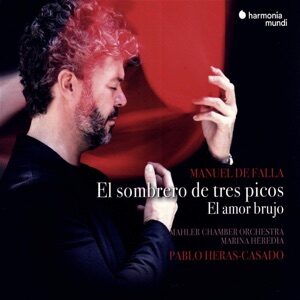This is a slick, sterile, completely unconvincing performance of The Three-Cornered Hat, a work that really takes very little effort to carry off successfully. Of course the playing of the Mahler Chamber Orchestra is super precise, but Heras-Casado’s unfeeling tempos and total lack of sheer danceability make listener a very unsatisfying experience. In particular, he dashes through the opening fanfare and the concluding Jota at blistering speeds that convey little of the music’s character or color. The other dances offer efficiency, but there’s so much more in this music than we hear in this performance.
El amor brujo goes significantly better, or at least less controversially, with one big exception: the singing of Marina Heredia. Here is yet another of those throaty, strangulated, “authentic” folk singers who has no business taking on the part. Falla’s folksong stylizations are just that, and the contrast between Heredia’s throaty huffing and puffing and the exceptional refinement of the orchestral playing is just plain ridiculous. Compare this to either of Nati Mistral’s performances to hear what Falla must have really had in mind, or better yet just get Mistral’s Decca recording (with Frühbreck de Burgos) and forget about this one entirely.
































